Emotional & Impactful: 2018’s Oscar Nominated Live Action Shorts
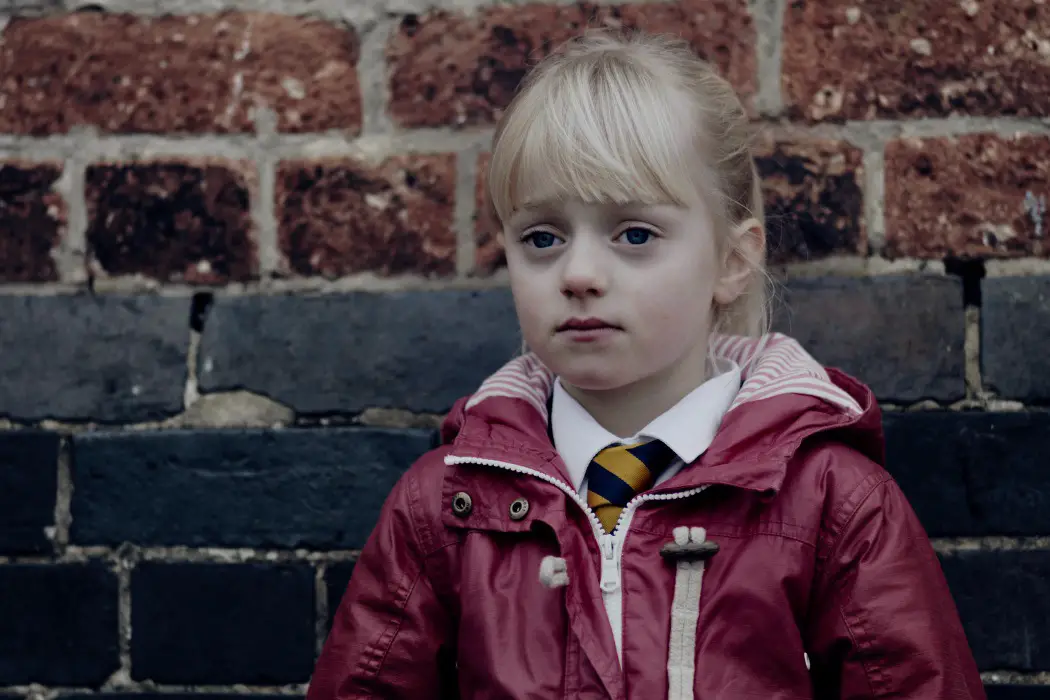
Stephanie Archer is 39 year old film fanatic living in…
Where Forest Gump once said that “Life is like a box of chocolates”, the same can be said about the Short Films: Live Action – you never know what you are going to get. What I hadn’t expected to get was a menagerie of emotions and heartbreak, laughter and terror. Each short film tackled issues that had a resounding impact during and after viewing, one with fast paced humor, two surrounding the terror and kindness of others, another concerning those left behind, and a fifth, focusing on a dark mark in history. They were a reminder of the past and shockingly applicable to many of today’s societal issues.
There is no question or doubt as to why these films were selected to showcase the growing talent that brought films to life in 2017. They are exemplary in the stories they tell and the means that were used to bring them to life. These are the 2018 Academy Award nominated Short Films: Live Action.
Dekalb Elementary (Reed van Dyk)
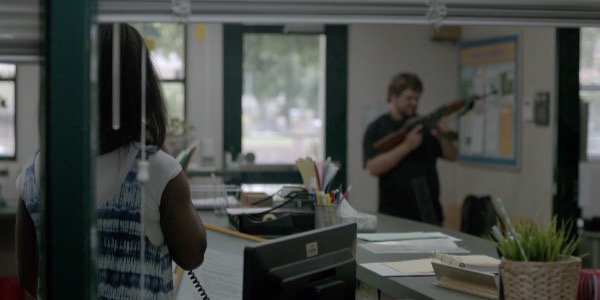
Dekalb Elementary from director/ writer Reed Van Dyk was the hardest of the five short films to watch. With the recent high school shooting in Florida, and the memory of Newtown fresh in mind, Dekalb Elementary was a shocking start to the night – not just because of the film’s content but also because of its resolution. I had not read about the films prior to my viewing as I wanted to be free to formulate my own opinions as I watched, as well as wanted the full viewing experience.
Least to say, I was shocked when the young boy who asks to use the phone begins rustling in a bag, my suspicions immediately confirmed that this film will hit close to home the moment his rustling reveals an assault rifle. I sat in my seat in disbelief of the scenario that could potentially play out. Yet, as I immediately suspected unwelcome violence, the film presented something so much more.
Based on true events in Atlanta, Georgia, Dekalb Elementary follows the intense and seemingly unpredictable intentions of an armed man (Bo Mitchell) in a school’s administrative office and the quick thinking and understanding school employee (Shinelle Azoroh) who finds the strength to talk him down and turn himself in. Presented as a mentally ill individual with an undisclosed vendetta against police, Reed Van Dyk finds the balance to acknowledge the bravery of Lakisha and the intense situation that Steven Hall introduces – without utilizing violence or death.
Dekalb does not end with injuries or death – the shooter does not turn the gun on himself – instead he complies with the encouraging words of Lakisha, who reveals the dark side she once experienced. Where hate and loathing follows incidents of this nature, Lakisha shows compassion and understanding – a rare kindness given to those who terrorize and threaten.
My Nephew Emmett (Kevin Wilson Jr.)
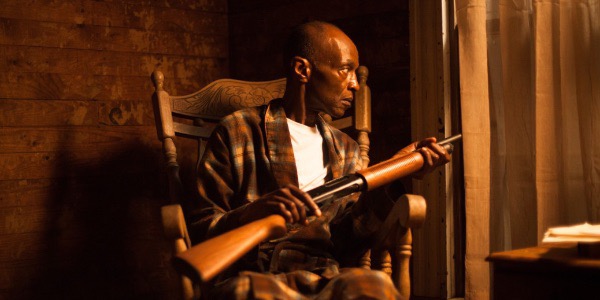
As we have read in history books and seen depicted on screen many times, the south in 1955 Mississippi was far from safe for any individual of color. Any reason could be cited for the need to “discipline” a member of the black community, and any crime could be done against them with no fear of reprimand or discovery. It did not matter who you were, where you came from, or the severity of what they called unacceptable – if you crossed a white man, he was coming for you.
My Nephew Emmett by director/writer Kevin Wilson Jr. begins just before sunset. Mose Wright (L.B. Williams) makes his way down to the water pump to fetch water, his frail and aging body showing signs of the passing time. Informed by a friend that his nephew (Joshua Wright) from Chicago was stirring up trouble with the locals, Mose heads back home, sullen with the knowledge of what will now come to pass once the sun has fallen.
Emmett has crossed a line, whistling at a white woman, and sure enough her husband and friend show up at the Wright’s door, with Mose’s informant, in the wee hours of the night to collect Emmet. Try as he might, Mose cannot stop what is happening or prevent what he know will come to pass, and to save the rest of his family, he must let the men take Emmett. The next day, Mose is brought to the river to identify the body of his nephew.
As a viewer, you knew how it would end for Emmett; we have seen it before, the unrelenting brutality and the unforgiving nature of the South. Your heart sinks as Emmett is led to the white pickup truck by the white men, the white woman in the car confirming he is the man they have come to collect. Mose tries to fight to save his nephew, but his frail body cannot fight these men, and words have no meaning between them. The white man, with his self imposed authority, continues to tell Mose that “we are just going to teach him a lesson and we will bring him right back”, Mose pleading that the boy isn’t from around here, he had no idea what he was doing. He knows that Emmett, like many men before him, will not be right back.
My Nephew Emmett ends with the revelation that Emmett is another innocent life snuffed out by the racial divide and brutality of the South. It also ends with a small spark of hope as Mose steps in front of a camera to tell his nephew’s story, the original footage from 1955 woven in to complete the film.
The Eleven O’Clock (Derin Seale)
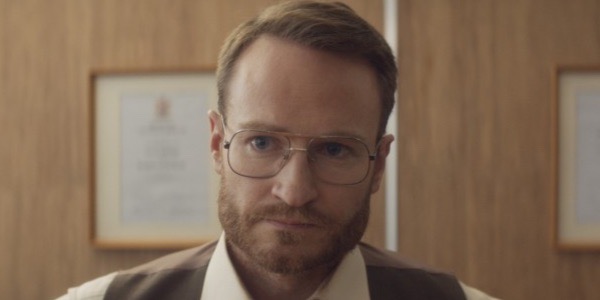
The Australian short The Eleven O’Clock by Derin Seale was actually the second to last film I saw of the night, and its upbeat, humorous and brilliant script was much welcomed after some of the heavy emotional films before it. Introducing herself as the stand in secretary for the morning, Linda (Jessica Wren) informs Dr. Phillips (Josh Lawson – who is also the film’s writer) that his eleven o’clock appointment will be arriving any moment. When she informs him that his first patient is a young man who believes he is a psychiatrist, the hilarity that follows is to perfection. When the patient (Damon Herriman) enters the office, he immediately begins inquiring why the gentleman is sitting at his desk. They each begin treating the other as the patient, executing a brilliant modern day rendition of “Who’s on First”.
Editing and framing is as steady and flawless as the script, electrifying and intensifying the frustration between both doctor and/or patient. Frames are held long and wide to capture the back and forth between them, while closeups of each, quickly edited in succession to match the rapid fire dialogue, heightens the frustration and confusion on the faces of each character. Lighting elevated the comedic mood, brightly reflecting off the 1970s setting of the doctor’s office, the set and attire of the doctor and/ or patient adding to the believability of the situation.
You will find yourself many times doubting whether you truly know who the true psychiatrist is, many times going back and forth as the chaos between the two elevates. And listen carefully, as each element the characters speak does not go to waste, playing very cleverly throughout the entire short and the impressive closing scene.
The Silent Child (Chris Overton)
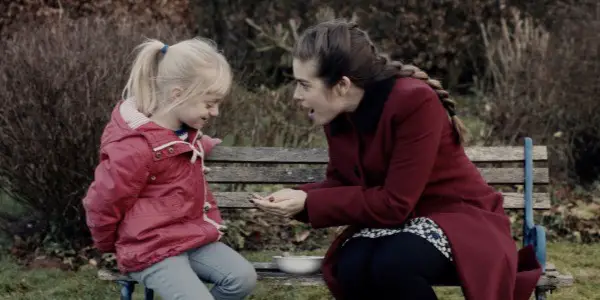
Born into a world of silence is difficult enough without those around you unable to give you the support, structure and understanding you need to survive in this world. This is the focus of Chris Overton‘s short film The Silent Child. Written by Rachel Shenton, who stars as social worker Joanne, and inspired by real life events, The Silent Child steps into the lives of a hectic middle class family whose youngest daughter Libby (Maisie Sly) is deaf and cut off from the family and the world.
Her mother Sue (Rachel Fielding) is disillusioned to her daughter’s disability, wanting nothing more than for her to talk like her other children, convinced she is “good at lip reading” – while all the while addressing Libby when her back is turned as though she can hear. Joanne is brought into the home to help give Libby tools to succeed in the upcoming school year – teaching Libby sign language, giving her the first real opportunity to speak.
Yet, as Libby progresses rapidly, her mother begins to resent the realization of what Libby will need to survive, pushing only for her to learn lip reading, unwilling to fight for extra support at school and eventually pushing Joanne away from the home. The Silent Child is a sad and emotional film that will break your heart from start to finish, each obstacle thrown at Libby a crushing realization of the world children with hearing loss Iive in – both at home and in school.
While heart crushingly sad, The Silent Child excels in its mission to bring awareness of these obstacles to light. Effectively using subtitles, and even removing sound at various parts of the film, pushes this awareness further, even if only for a moment placing you in Libby’s shoes. Cinematographer Ali Farahani brings an almost veil like lighting to the beginning of the film, a veil that thins like fog as we are thrown deeper into the obstacles Libby and other children like her face. Some of the most brilliant cinematographic shots are at night as Joanne and Libby lay in their respective beds, their faces basked and lit only by the moon. Through the darkness, we see them and they see each other.
Watu Wote: All of Us (Katja Benrath)
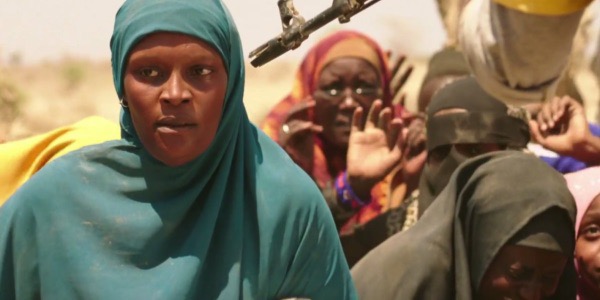
Watu Wote: All of Us by director Katja Benrath was the final film I saw during my night of the Short Films: Live Action – and my favorite of the bunch. Up until this film, I was certain that nothing could beat The Silent Child – a sure thing at its conclusion. Yet, Watu Wote: All of Us would prove to be more impactful and strikingly more emotional than one would think. It follows a young Christian woman beginning her 31-hour journey home to visit her sick mother.
Her journey will face potential violence and discrimination as the bus she will be traveling on will cross between Kenya and Somalia, an area where Christians and Muslims are in constant turmoil. While assured the bus will have police escort, the police cars break down along the route, leaving the bus and its passengers defenseless. When they are ambushed by extremists, the Muslim passengers do everything in their power to protect the lives of their fellow Christian travelers – some even giving their lives.
Director Katji Benrath, the only female director nominated in this category, excels in creating tension between individuals with nothing but an unspoken difference between them. Based on a true story, she creates an atmosphere of distrust throughout the bus that enhances the shock of those who would give their lives for someone they just met – and someone who does not trust or like them.
an epic showcase of humanity and selflessness only heightened after revealing this is based on a true story – traveler Al-Shabaab Leader (Hassan Yaqub) giving his life to save the woman who just the previous day categorized him based on his religion and the atrocities others had carried out in Allah’s name.
That’s a wrap!
As expected, this years Oscar nominated live action short films were a menagerie of talent and emotions. Strikingly memorable and resounding, they are an epic showcase of the talent within the industry and of great things to come in the future.
Have you seen any of these live action short films? Which do you think will be the winner? Tell us your thoughts in the comments below!
Does content like this matter to you?
Become a Member and support film journalism. Unlock access to all of Film Inquiry`s great articles. Join a community of like-minded readers who are passionate about cinema - get access to our private members Network, give back to independent filmmakers, and more.













